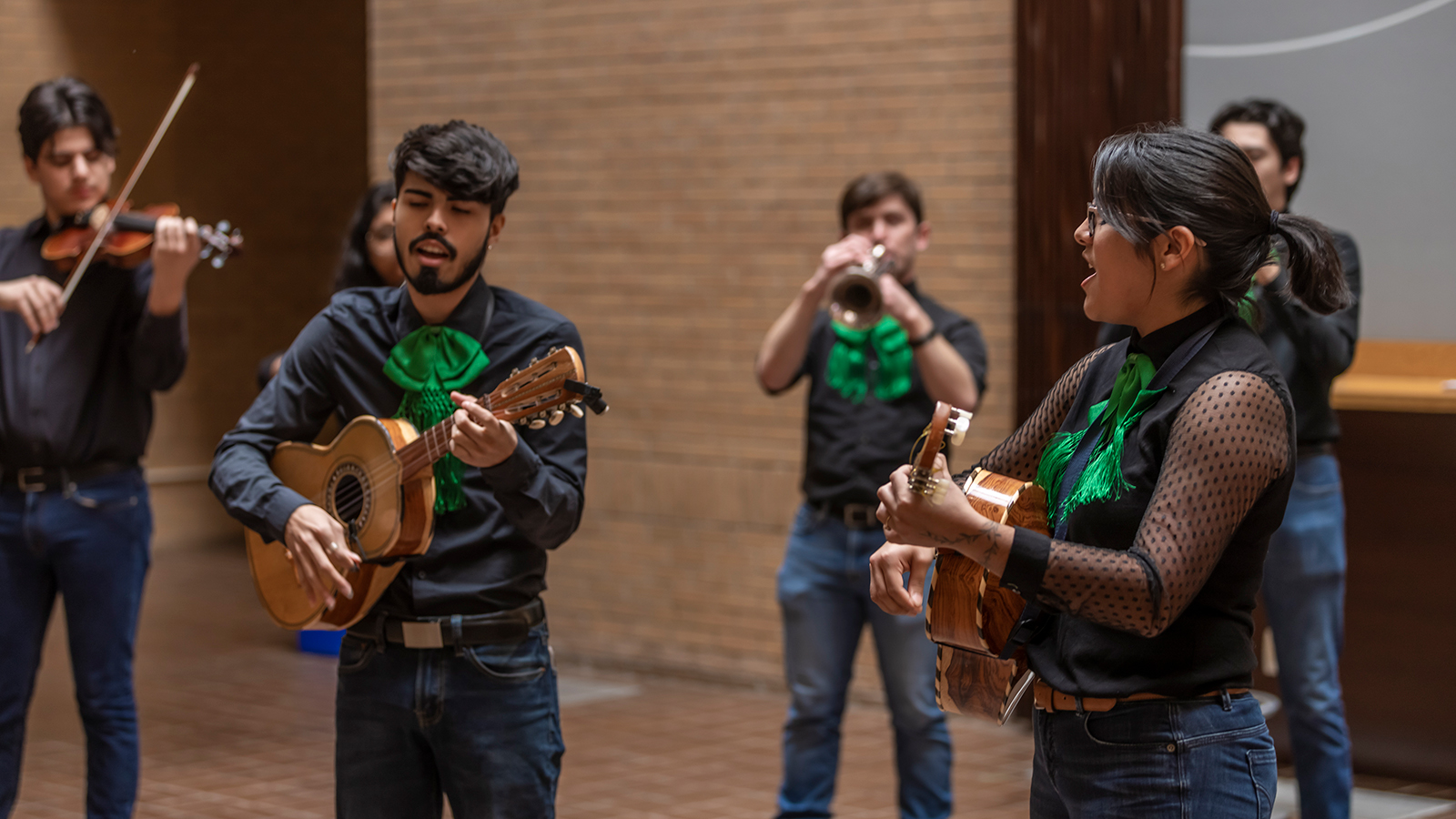- AcademicsDegree TypeLocations
- Admissions
- Tuition & Aid
- Student Life
- About UNT
- Research
- Athletics
- Giving

Ethnomusicology Master's
Master of Arts (M.A.)
Program type:
Major
Format:
On Campus
Est. time to complete:
2-3 years
Credit Hours:
37
Become more fluent in the universal language of music and its significance for cultures
from all over the world.
Through fieldwork — conducting interviews; attending, participating in, and observing
performances; learning about local history, language, and customs; and doing musical
analysis — ethnomusicologists study the ways in which individuals learn, create and
understand music in different cultural communities, the means by which music is transmitted
via both social and media networks, the significance of music revivals, and the impact
of new contexts on the style and meaning of music.
Want more info?
We're so glad you're interested in UNT! Let us know if you'd like more information and we'll get you everything you need.
Request More InfoWhy earn a degree in Ethnomusicology?
Courses at both the undergraduate and graduate level are open to all students regardless of major. Whether in graduate seminars or in one of the many world music ensembles, the program emphasizes doing ethnomusicology. The curriculum challenges students to engage musical experience in all of its dimensions in preparation for careers in both academia and the public sector.
The Ethnomusicology Program is home to a distinguished faculty, whose professional experience and expertise range from extensive work in the public sector to specialization in the music of Latin America, Texas and the American Southwest, Africa, India, and includes internationally recognized master musicians from those traditions.
Marketable Skills
- Instruction of musical skills
- Music copying and transcribing
- Public event management assistance
- Book/journal editing
- Advanced data collection and analysis
Ethnomusicology Master's Highlights
Our students have published in peer-reviewed journals, presented at international
conferences, and have received significant external grant support, including a 2017
Fulbright-Hays Doctoral Dissertation Research Abroad Fellowship and two nationally
competitive Theodore R. Presser Foundation Graduate Music Awards (2016, 2018).
Our students have published in peer-reviewed journals, presented at international
conferences, and have received significant external grant support, including a 2017
Fulbright-Hays Doctoral Dissertation Research Abroad Fellowship and two nationally
competitive Theodore R. Presser Foundation Graduate Music Awards (2016, 2018).
Ethnomusicology Master's Courses You Could Take
Anthropological Thought and Praxis I (3 hrs)
This course considers the history of anthropological concepts, the major historical
debates in anthropological theory and historical tensions between applied and theoretical
knowledge. Special emphasis is given to critical examination of concept and theory
formation and the application of anthropological ideas to the problems of everyday
life.
Ethnomusicology Field and Research Methods (3 hrs)
Students will explore the relationship between shifting theoretical research paradigms
and how they have affected field methodology with close readings of representative
ethnographies, several short field assignments and reports, and a field research project,
resulting in a final paper.
Anthropology of Sound (3 hrs)
This course examines sound from a cross-cultural perspective by opening up a dialogue
about alternative sonic practices, which challenge many taken-for-granted notions
about contemporary theories of sound.
Music of Africa (3 hrs)
This course is a study of musical experience in African life. How does music function
in everyday life, in ritual and ceremony? When does music happen and for what reasons?
Questions are explored in relation to African music, ranging from the complex vocal
polyphony of the Mbuti Pygmies of the Itui Forest to the worldwide explosion of Afro
Pop.
Graduate Review of Jazz History (3 hrs)
Students will study the standard narrative of jazz history and jazz repertoire.
Seminar in Ethnomusicology (3 hrs)
This course focuses on selected topics in ethnomusicology including current theoretical
and practical issues in the discipline.
Learn More About UNT
Watch this video to learn more about what makes UNT great!